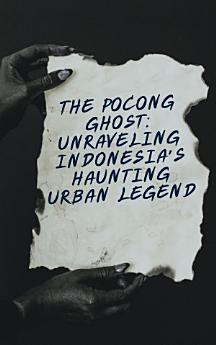The Pocong Ghost: Indonesia's Haunting Urban Legend
About this ebook
Origin and Appearance
The pocong is believed to be the soul of a deceased person who has not been properly released from their burial shroud. Its distinctive appearance is central to the legend: a figure entirely wrapped in a white burial shroud (kain kafan), with visible facial features, tied above the head, at the neck, and the feet. This appearance is directly tied to Islamic burial practices in Indonesia, where bodies are wrapped in a simple white cloth before interment.
Behavior and Movement
What sets the pocong apart from other supernatural entities is its unique mode of movement. Due to the binding of the shroud around its feet, the pocong is said to hop or jump rather than walk. This distinctive hopping motion adds to its eerie and unsettling nature. The pocong is often described as appearing suddenly and disappearing just as quickly, adding to its supernatural aura.
Purpose and Motivations
Unlike some malevolent spirits in folklore, the pocong is generally not seen as aggressive. Its existence is often attributed to unfinished business, improper burial rites, or the need to communicate with the living. This reflects cultural beliefs about the ongoing connection between the world of the living and the realm of the dead. In some versions of the legend, a pocong will find peace or disappear after 40 days if not released from its shroud, aligning with traditional Islamic mourning practices.
Cultural Significance
The pocong legend serves several important cultural functions in Indonesian society. It reinforces the importance of proper funeral rites and respect for the dead. The fear of becoming a pocong after death encourages people to settle their affairs and fulfill their obligations in life. The legend also reflects broader beliefs about the nature of death, the afterlife, and the ongoing relationship between the living and the deceased.








